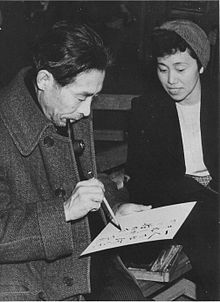Kunio Kishida
| Kishida Kunio | |
|---|---|
 |
|
| Native name | 岸田國士 |
| Born |
November 2, 1890 Yotsuya, Tokyo |
| Died | March 5, 1954 (aged 63) |
| Occupation | playwright, novelist, critic, translator, impresario |
| Language | Japanese |
| Nationality | Japan |
| Alma mater | Meiji University, University of Tokyo |
| Genre | Shingeki |
| Notable works | A Warm Current |
Kunio Kishida (岸田 國士 Kishida Kunio?, 2 November 1890-5 March 1954, b. Yotsuya, Tokyo, Japan) was one of the most prominent Japanese dramatists and writers of the early 20th century and is regarded as one of the founders of modern Japanese drama.
His father, Shozo Kishida, descended from a samurai family of Kishu and worked as a military officer in the imperial guard. As the eldest son in his family, it was expected that Kishida would carry on the military tradition. He graduated from the Japanese Military Academy in 1912, and he served as sub-lieutenant in the army for two years. In 1916 Kishida enrolled at the University of Tokyo in order to study French Literature. While attending university, Kishida became interested in French theatre, and in 1919 he left the University of Tokyo without graduating and sailed for France. He arrived in Paris in 1920, and managed to sustain himself by working part-time as a translator for the Japanese Embassy and for the Secretariat of the League of Nations. Kishida started to attend lectures at the University of Paris, and it was through his professor there that he was introduced to Jacques Copeau. He studied the nuances of French theatre under Copeau, and he became exposed to performances of Shakespeare, Chekhov, and Beaumarchais through Copeau’s productions. In October 1922, Kishida experienced a lung hemorrhage and left his studies to recuperate in southern France. A month into his recovery, Kishida heard news that his father died and he immediately returned to Tokyo to take care of his mother and sisters.
He became interested in earnestly pursuing playwriting after a dinner with author Yuzo Yamamoto in early 1923. The earthquake that wreaked havoc in Tokyo in 1923 caused Kishida to put his playwriting on hold and pursue other means of making a living. By 1924, Kishida had become a large force in the rebirth of the New Theatre movement in the wake of the earthquake, helping to establish the magazine Engeki Shincho (New Currents of Drama) along with the founder of the Tsukiji Little Theater Kaoru Osanai. It was in this magazine that Kishida’s earliest play Furui Omocha (Old Toys) was first published. While they started out as colleagues, the disparity in ideals between Kishida and Osanai caused a rift in their relationship. Kishida wrote a scathing review for a literary magazine of the first three productions at the Tsukiji Little Theater, criticizing the actors, choice of plays, and the character of Osanai himself. In turn, Osanai cut off all relations with Kishida and refused, despite popular demand, to produce any of his plays.
...
Wikipedia
